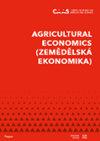Cross-border Euro-regional activation and regional development in Slovakia
IF 1.9
4区 经济学
Q2 AGRICULTURAL ECONOMICS & POLICY
引用次数: 0
Abstract
Social-political transition in the former socialist countries led to a new understanding of borders and created the prerequisites for renaissance and significant activation of the cross-border co-operation. This way, Slovakia along with other countries joined the Euro-regional movement in Europe, which spread since the end of 60-ies through Western-European countries. Formation and institutionalisation of Euro-regional relations, links and co-operation was initially hindered by a whole range of obstacles, including the ones with political background. It was obvious mainly in Slovakia where it influenced the existence and potential establishment of new Euro-regional associations. Rebirth of the Euro-regional activities started after 1998. Currently, there are Euro-regions practically operating along the entire Slovak border with its neighbours. The extent and form of institutionalisation and professional staffing varies. Activities of Euro-regions are merely based on projects which bring funding. Projects are broadly oriented, while the prevailing focus is currently on the economic activation of Euro-regions. There is a lack of partner co-operation and co-ordination of activities between countries and their activities, including cross-border activities and activities of Euro-regions. Euro-regional activities play a significant role in activation of border areas in the country, while they have a complementary character for the regional state policy and regional policy of self-governed regions which is being formulated.斯洛伐克的跨界欧洲-区域激活和区域发展
前社会主义国家的社会政治转型导致了对边界的新认识,并为跨境合作的复兴和重大激活创造了先决条件。这样,斯洛伐克和其他国家一起加入了从60年代末开始在西欧国家蔓延的欧洲-地区运动。欧洲-区域关系、联系和合作的形成和制度化最初受到一系列障碍的阻碍,包括具有政治背景的障碍。这主要在斯洛伐克表现得很明显,它影响了新的欧洲-区域协会的存在和可能的建立。欧洲区域活动的复兴始于1998年以后。目前,在斯洛伐克与其邻国的整个边界上实际上有几个欧洲区域在运作。机构和专业人员配备的程度和形式各不相同。欧洲地区的活动仅以带来资金的项目为基础。项目面向广泛,而目前的主要重点是活化欧洲区域的经济。国家之间及其活动缺乏合作伙伴的合作和协调,包括跨境活动和欧洲地区的活动。欧洲-区域活动在激活该国边境地区方面发挥了重要作用,同时它们对正在制定的区域国家政策和自治区域的区域政策具有补充作用。
本文章由计算机程序翻译,如有差异,请以英文原文为准。
求助全文
约1分钟内获得全文
求助全文
来源期刊

Agricultural Economics-Zemedelska Ekonomika
Agricultural Economics & Policy-
CiteScore
4.30
自引率
4.50%
发文量
47
审稿时长
30 weeks
期刊介绍:
An international peer-reviewed journal published under the auspices of the Czech Academy of Agricultural Sciences and financed by the Ministry of Agriculture of the Czech Republic. Published since 1954 (by 1999 under the title Zemědělská ekonomika).Thematic scope:
original scientific papers dealing with agricultural subjects from the sphere of economics, management, informatics, ecology, social economy and sociology. Since 1993 the papers continually treat problems which were published in the journal Sociologie venkova a zemědělství until now. An extensive scope of subjects in fact covers the whole of agribusiness, that means economic relations of suppliers and producers of inputs for agriculture and food industry, problems from the aspects of social economy and rural sociology and finally the economics of the population nutrition. Papers are published in English.
 求助内容:
求助内容: 应助结果提醒方式:
应助结果提醒方式:


